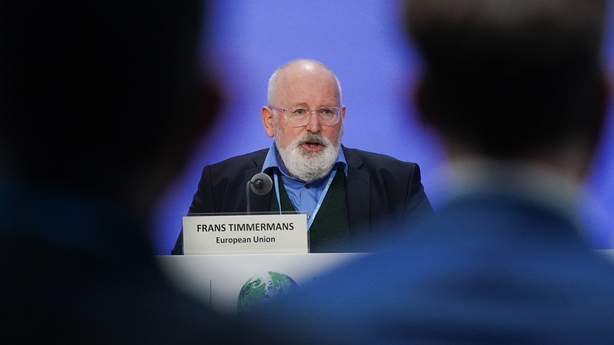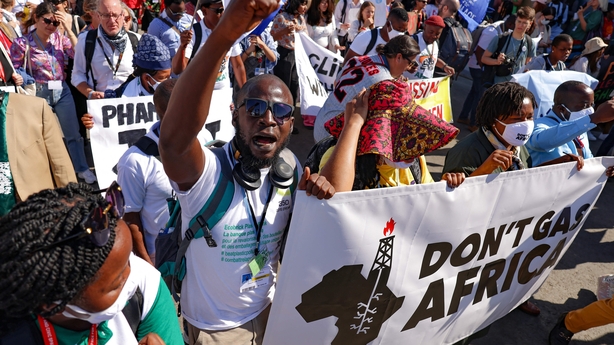The European Union supports a call by India to phase down fossil fuel use as part of a COP27 deal, the bloc's climate policy chief Frans Timmermans has said, provided it does not weaken previous agreements on reducing the use of coal.
India, the world's second-biggest buyer of coal, wants countries to agree to phase down all fossil fuels at the UN climate summit in Egypt, rather than a narrower deal to phase down coal that was agreed at COP26 last year.
"We are in support of any call to phase down all fossil fuels," Mr Timmermans told a news conference.
"But we also have to make sure that this call does not diminish the earlier agreements we had on phasing down coal, so if it comes on top of what we already agreed in Glasgow, then the EU will support in this proposal."
Mr Timmermans' comments come even as the EU ramps up its quest for coal and natural gas in the near term to counter an energy supply crunch triggered by high demand and supply disruptions since Russia's invasion of Ukraine.
The proposal could benefit India by easing the global focus on its coal use, but is also likely to face stiff opposition from developing countries with rich oil and gas deposits that want to avoid language limiting their use.

"We have come out strongly to indicate that we should be facilitated to sustainably explore our oil and gas resources," Irene Batebe, permanent secretary at Uganda's energy ministry, said.
"For us, and that's the African Union's position, we wouldn't be pushing for a phase down, unless the phase down is clearly defined, because many of us are discovering new resources," Ms Batebe said.
Saudi energy ministry official and COP27 negotiator, Khalid Abuleif, said his country, the Organization of the Petroleum Exporting Countries' biggest producer, was worried the final talks would "demonise" the fossil fuel industry.
India was among the countries resistant to efforts to eliminate coal at last year's climate talks in Glasgow when the final deal at the last minute dropped wording calling for a phase out of coal-fired power, replacing it with phase down.
Mr Timmermans said the EU was not seeking to dictate a country's investment plan but wanted to send a warning on investing in fossil fuels.
"I'm not telling African countries not to invest in fossils, let me be very clear about that. I'm just telling them 'be careful what you do' because if you invest in coal now, you're sure to create stranded assets. If you invest in oil, you're probably going to create stranded assets," he said.
He said natural gas "is a different situation for which I have some understanding, especially if you combine that with infrastructure that is prefitted to also carry gases with other densities, such as green hydrogen or green ammonia in the future."
Natural gas burns cleaner than coal, but drilling it and getting it to market often leads to leaks of methane, a powerful greenhouse gas.
The Egyptian COP27 Presidency last night released a two-page sketch of what could become a deal, featuring bullet points outlining many of the issues countries have asked be included - some of which have deeply divided nations.
The document did not refer to fossil fuels, although a COP Presidency spokesperson later said the list was not exhaustive and did not contain the language that would be used in the final version.
North vs South
COP27 has exposed deep divisions between wealthy polluters and nations vulnerable to the most ferocious climate impacts.
"The lack of leadership and ambition on mitigating greenhouse gas emissions is worrisome," said Senegalese Environment Minister Alioune Nodoye, speaking on behalf of the Least Developed Countries Group.
Belize Climate Change Minister Orlando Habet called for more action from the G20 group of the world's wealthiest nations, which are responsible for 80% of global emissions and are meeting at summit in Indonesia.
"In how many COPs have we been arguing for urgent climate action? And how many more do we need, how many lives do we need to sacrifice," Mr Habet said.

UN climate talks often go into overtime and this year's meeting, due to end on Friday, could be no different.
The first draft of the final declaration only has bullet points so far, with a line on the "urgency of action to keep 1.5C in reach".
Wealthy and developing nations are sharply divided over money at COP27.
Developing countries says this year's floods in Pakistan, which have cost the country up to $40 billion, have highlighted the pressing need to create a "loss and damage" compensation fund.
In a small breakthrough, the United States and European Union agreed to have the issue discussed at COP27.
But Western governments favour using existing financial channels instead of building a new mechanism.
The draft declaration mentions the "need for funding arrangements to address" loss and damage -- language used by the United States and Europeans since COP27 started on 6 November.
"Loss and damage must remain firmly on the table as we continue to witness increasing appearances of severity of climate change impacts everywhere," Samoan Prime Minister Fiame Naomi Mata'afa told delegates.
"The financial burden for loss and damage falls almost entirely on affected countries and not those most responsible for climate change."


